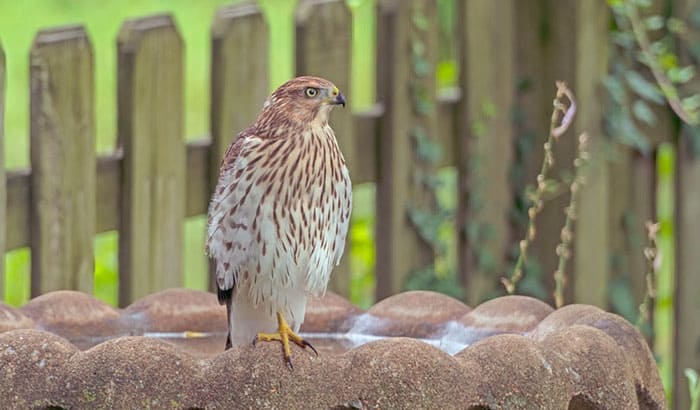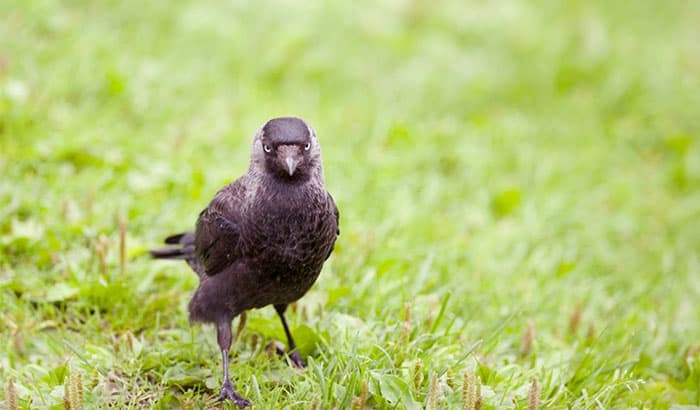Be wary of hawks and crows if you take care of small pets, as these birds of prey will show no mercy. You would want to keep them away from your backyard as much as possible as they could effortlessly snatch their prey without warning.
You may enjoy the sight of a majestic hawk soaring over the yard, but what you might not realize is that it is already targeting your pets for its next meal. They are agile hunters with powerful claws and dynamic flying skills.
Crows, big black hungry birds, are also a real threat. They are intelligent beings who can adapt to different environments, urban or rural. They also come in flocks of hundreds, even thousands, and can cause many problems to all types of properties.
How to Deter Hawks
Hawks are considered to be crucial members of the ecosystem. They help maintain nature’s balance by controlling the population of small animals, including vermin such as mice and voles. Although, you may consider them as a menace if you’re a poultry farmer, rabbit owner, or own small pets.
Hawks often threaten farmyard chickens and ducks and capture small songbirds from their feeders. Some of them even attack small pets. Despite federal and state laws prohibiting the capturing or killing of hawks without a special permit, you can take action to make your property less appealing to these birds of prey.
Place an owl decoy
The best way to get rid of hawks is to use their fears. Owls are actually predators of hawks. If they see an “owl” on your property, they might not feel safe and think of them as tough competition for food.
These deterrents can be very effective if you choose the right one and use it properly. You should pick decoys that look realistic and move them around frequently. Hawks are intelligent creatures and might know if the owl is fake if it only stays in one spot.
Shield your bird feeders
Bird feeders can attract many wild animals to your backyard, including hawks. Some good ways to keep your small birds safe would be to avoid windows, have emergency shelters, and use feeder cages. You can also move your bird feeder to low-hanging tree branches or under roof awnings.
If your bird feeders are too close to windows, panicked birds will try to escape when they see predators and might accidentally fly into the glass. You should place them near “emergency shelters” like bushes or enclosed structures so they can have a place to hide in case.
You can also use a caged bird feeder since predators will have a difficult time catching your birds. This keeps away hawks and other bullies too, like grackles and pigeons.
Set up reflective deterrents
This is one good way to keep off hawks without harming them. Hanging CDs or silverware on trees or putting up a mirror ball on a stick could help scare them away. This trick is a very effective and also cheap way since you probably already have these in your home anyway.
Keep in mind that these might not be effective in the long term as hawks will ignore these once they deem they pose no threat. It would still be best to move these around when you can.
Avoid ground feeding
It may feel nice to scatted bird feed on the ground and watch sparrows and other little birds peck away. But sadly, this makes it easier for hawks to prey on them. They can’t react quickly and don’t have many options for escape.
The best way to avoid hawks from swooping in is to stop ground feeding and avoid using low feeders to lower their accuracy when they attack.
How to Deter Crows
Scarecrows
From the term itself, scarecrows are a good way to scare off crows. Although, they do not only keep crows away but also other birds of prey and other crop-killing pests. Scarecrows are often made in the shape of a human and are dressed in old clothes.
Just like the owl decoy and reflective deterrents, make sure to constantly move this around as hawks pay attention and pick up on tricks fast.
Use noise deterrents
Noise deterrents are another good way to keep crows away. It’s best to use an ultrasonic bird and pest repeller for this. You can customize its settings like volume and frequency to your liking.
Some bird repellers, like the Cleanrth Bird Repeller, even have triple scanning technology and can detect unwanted birds from up to 82 feet away. It can produce sounds and even has strobe lights that are effective in repelling birds. You can hang bird repellers in your backyard to discourage hawks from swooping in.
This is one of the best ways for repelling hawks as there are no toxic residues and adverse environmental effects. There are also no ways this could injure them in any way!
Keep your yard clean
Keeping your yard clean is a simple way of deterring crows. If there is one thing that attracts crows, that is a dirty place.
Crows are omnivores so they eat almost anything; small mammals, seeds, insects, fruits, birds, and yes, even trash. Thus, by simply cleaning your yard and covering your trash cans properly, you are taking away their possible sources of food.
Do not Harm Hawks and Crows!
As much as you would want them off your backyard, avoid harming hawks and crows as much as possible. Not only is it illegal, but it is animal cruelty. They are vital in controlling other pests which is why they are protected in the U.S. by Federal law.
Conclusion
Hawks and crows are great creatures that have an important role in keeping the balance of nature. However, they are definitely animals you would not want in your backyard as they could prey on your small pets and more.
There are many ways to keep them off your lawn such as putting decoys, using deterrents, protecting your bird feeders, using scarecrows, and avoid ground feeding. However, you should keep in mind that they will not always be effective as hawks and crows are intelligent birds.
One thing to remember is under no circumstances should you harm hawks or crows. They are just doing their part to help mother nature and also, it is against the law. Injuring or killing them could lead to fines or worse so you should just try to keep them off your backyard any way you can.


